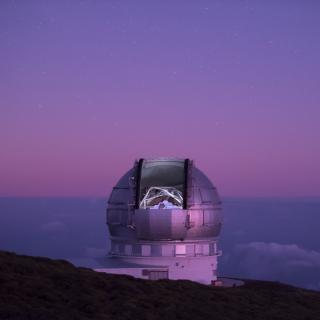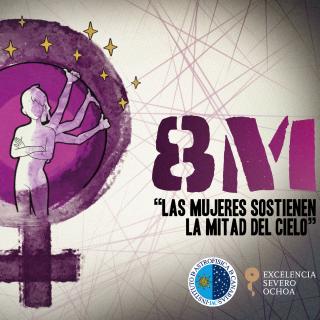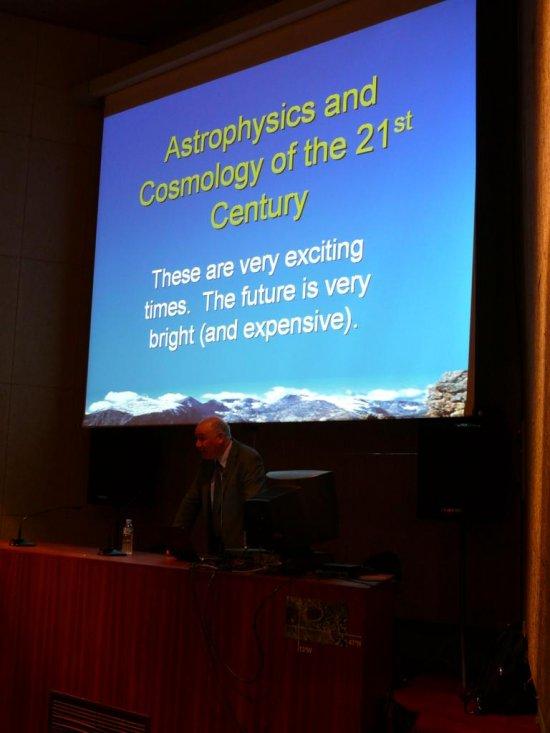It may interest you
-
 The Solar System research group at the Instituto de Astrofísica de Canarias (IAC) is participating in the international programme to keep a closet track of asteroid 2024 YR4. The aim is to determine its orbit with the highest possible precision before it stops being observable by ground based and satellite telescopes in April, and so improving our value of the probability that it will impact the Earth in 2032. In this context several telescopes of the Canary Observatories of the IAC are playing an outstanding role in this observing campaign: The Gran Telescopio Canarias (GTC) at the Roque deAdvertised on
The Solar System research group at the Instituto de Astrofísica de Canarias (IAC) is participating in the international programme to keep a closet track of asteroid 2024 YR4. The aim is to determine its orbit with the highest possible precision before it stops being observable by ground based and satellite telescopes in April, and so improving our value of the probability that it will impact the Earth in 2032. In this context several telescopes of the Canary Observatories of the IAC are playing an outstanding role in this observing campaign: The Gran Telescopio Canarias (GTC) at the Roque deAdvertised on -
 El programa de divulgación científica del Instituto de Astrofísica de Canarias (IAC) en La Radio Canaria, "Soñando Estrellas", emitirá su próximo episodio, este viernes, 28 de noviembre, a las 22:30 horas. El espacio, de 30 minutos de duración, está dirigido y presentado por Verónica Martín, jefa de la Unidad de Comunicación y Cultura Científica (UC3) del IAC. En este episodio la investigadora del IAC, Cristina Ramos Almeida, responderá a la pregunta de cómo nacen y crecen las galaxias y, especialmente, a cómo mueren. La investigadora, que recientemente recibió el Premio Mujer Tenías que SerAdvertised on
El programa de divulgación científica del Instituto de Astrofísica de Canarias (IAC) en La Radio Canaria, "Soñando Estrellas", emitirá su próximo episodio, este viernes, 28 de noviembre, a las 22:30 horas. El espacio, de 30 minutos de duración, está dirigido y presentado por Verónica Martín, jefa de la Unidad de Comunicación y Cultura Científica (UC3) del IAC. En este episodio la investigadora del IAC, Cristina Ramos Almeida, responderá a la pregunta de cómo nacen y crecen las galaxias y, especialmente, a cómo mueren. La investigadora, que recientemente recibió el Premio Mujer Tenías que SerAdvertised on -
 The Instituto de Astrofísica de Canarias (IAC) is strengthening its commitment to Equality and, to coincide with the commemoration of March 8th, International Women’s Day, is presenting its IV Plan for Equality. This document covers the active work within the IAC to support Equality and Fairness in the working and institutional environment, and proposes specific measures to ensure that both of these aims are achieved. The IAC has pioneered the introduction of policies of Equality in the field of science in Spain. Even before the approval of the Organic Law 3/2007 for the effective equalityAdvertised on
The Instituto de Astrofísica de Canarias (IAC) is strengthening its commitment to Equality and, to coincide with the commemoration of March 8th, International Women’s Day, is presenting its IV Plan for Equality. This document covers the active work within the IAC to support Equality and Fairness in the working and institutional environment, and proposes specific measures to ensure that both of these aims are achieved. The IAC has pioneered the introduction of policies of Equality in the field of science in Spain. Even before the approval of the Organic Law 3/2007 for the effective equalityAdvertised on
